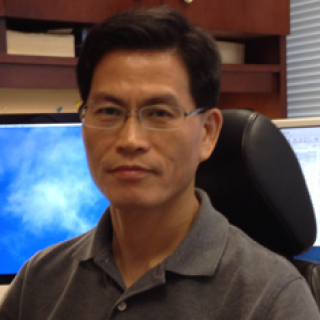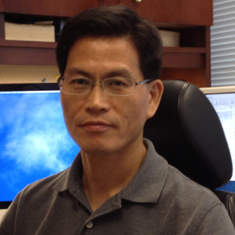
Kyung S. Lee, Ph.D.
- Center for Cancer Research
- National Cancer Institute
- Building 37, Room 3122C
- Bethesda, MD 20892
- 240-760-7276
- kyunglee@mail.nih.gov
RESEARCH SUMMARY
Dr. Kyung Lee carries out pioneering research aimed at understanding the structure and function of centrosomal self-assemblies and their associated regulatory complexes in human cells. He combines cell biology, structural biology, and cryo-EM to investigate how pericentriolar proteins organize themselves and serve as a platform to physicochemically regulate centriole duplication in a three-dimensional space. A failure in this process can result in abnormal centrosome numbers, improper spindle formation, and chromosome missegregation that leads to genomic instability culminating in genetic disorders such as cancer, microcephaly, ciliopathy, and dwarfism. Dr. Lee has also been investigating the function of mammalian polo-like kinase 1 (Plk1) and has been developing small molecule inhibitors that have potential as anti-cancer therapeutics. Through collaborations with Dr. Ken Jacobson at the National Institute of Diabetes and Digestive and Kidney Diseases, as well as multiple teams at the National Center for Advancing Translational Sciences, Dr. Lee has been steering a drug discovery program to develop inhibitors that target the noncatalytic polo-box domain (PBD) of Plk1, a unique protein-protein interaction module critical for substrate recognition. PBD inhibitors could present a new avenue for overcoming the hurdles currently facing anti-Plk1 therapy and may offer improved therapeutic potential.
Areas of Expertise

Kyung S. Lee, Ph.D.
Research
Life is established through varying degrees of hierarchical self-organization, from individual molecules and complexes to higher-order macromolecular assemblies. Understanding how cells orchestrate these diverse structural entities to induce a specific biological function is a key step to understanding the mystery of life. We have established an interdisciplinary research program aimed at addressing two fundamental questions:
- How are higher-order macromolecular assemblies generated?
- How are they further organized into a macroscale subcellular architecture to lay the foundations for inducing discrete intracellular processes?
The centrosome, which plays a central role as the main microtubule-organizing center for animal cell division, appears to be a particularly attractive model system for studying the formation of higher-order architectures thanks to the presence of multiple scaffold proteins that are concentrically arranged around a centriole in a highly ordered manner. For the past few years, we have been investigating the structure and function of several pericentriolar scaffolds, such as Cep192, Cep152, and Cep63, along with its effector, Polo-like kinase 4 (Plk4), a key regulator for centriole duplication. Our multifaceted approach has brought together wide-ranging fields, including cell biology (e.g., super-resolution microscopy, atomic force microscopy), biophysical chemistry (e.g., analytical ultracentrifugation, circular dichroism, SEC-MALS), structural biology (e.g., X-ray crystallography, NMR spectroscopy, SAXS), electron microscopy (e.g., thin-section TEM, cryo-EM), and nanomaterials science (e.g., nanopillar technology).
Our experience has been enriched by working effectively with supramolecular architectures generated through intricately regulated physicochemical processes. Our long-term goal is to understand the organization and function of the centrosome as a holistic functional entity. This research may offer a new paradigm for investigating the ways in which macroscale supramolecular assemblies are architected to achieve a new level of functional proficiencies, and it may provide a potential roadmap for studying other biological processes orchestrated by higher-order subcellular structures.
Publications
- Bibliography Link
- View Dr. Lee's Complete Bibliography at NCBI.
Centrosome amplification and aneuploidy driven by the HIV-1-induced Vpr•VprBP•Plk4 complex in CD4+ T cells
Specific inhibition of an anticancer target, polo-like kinase 1, by allosterically dismantling its mechanism of substrate recognition
Phase separation of Polo-like kinase 4 by autoactivation and clustering drives centriole biogenesis
Molecular architecture of a cylindrical self-assembly at human centrosomes
Molecular basis for unidirectional scaffold switching of human Plk4 in centriole biogenesis
Biography

Kyung S. Lee, Ph.D.
Dr. Kyung Lee received his Ph.D. in 1994 from the Department of Biochemistry at Johns Hopkins University in Baltimore. He then worked with Dr. Raymond Erikson at Harvard University as a postdoctoral fellow studying protein kinase and cancer. In 1998, he joined NIH as a tenure-track investigator in the Laboratory of Metabolism at NCI. In 2005, Dr. Lee became a senior investigator and head of the Chemistry Section, Laboratory of Metabolism.
Dr. Lee is the recipient of an NCI Intramural Research Award, a Society for Biomedical Research CKD Award, an NCI CCR Synergy Award, and several Federal Technology Transfer Awards for his inventions and patents related to Plk1. He serves as an academic editor for PLoS ONE and an editorial board member for The Journal of Biological Chemistry.
Job Vacancies
We have no open positions in our group at this time, please check back later.
To see all available positions at CCR, take a look at our Careers page. You can also subscribe to receive CCR's latest job and training opportunities in your inbox.
Team
News
Learn more about CCR research advances, new discoveries and more
on our news section.

